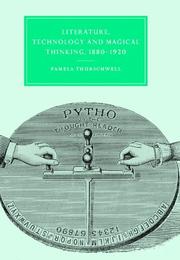
Literature, technology, and magical thinking, 1880-1920
By Pamela Thurschwell
Subjects: Literature, modern--english, Parapsychology--in literature, Occultism in literature, English literature, history and criticism, 19th century, Homosexuality and literature, English literature, history and criticism, 20th century, Literature and technology--great britain--history--19th century, Pr468.m34 t48 2001, English literature--20th century--history and criticism, Literature and technology, Literature and technology--great britain--history--20th century, Magic in literature, English literature--19th century--history and criticism, Spiritualism in literature, Psychoanalysis and literature, 820.9/37, Telepathy in literature, Literature and technology--history, English literature--history and criticism, History and criticism, English literature, History
Description: "In this book Pamela Thurschwell examines the intersection of literary culture, the occult and new technology at the fin-de-siecle. Thurschwell argues that technologies such as the telegraph and the telephone annihilated distances that separated bodies and minds from each other. As these new technologies began suffusing the public imagination from the mid-nineteenth century on, they seemed to support the claims of spiritualist mediums. Talking to the dead and talking on the phone both held out the promise of previously unimaginable contact between people: both seemed to involve 'magical thinking'. Thurschwell looks at the ways in which psychical research, the scientific study of the occult, is reflected in the writings of such authors as Henry James, George Du Maurier and Oscar Wilde, and in the foundations of psychoanalysis. This study offers new and provocative interpretations of fin-de-siecle literary and scientific culture in relation to psychoanalysis, queer theory and cultural history."--BOOK JACKET.
Comments
You must log in to leave comments.